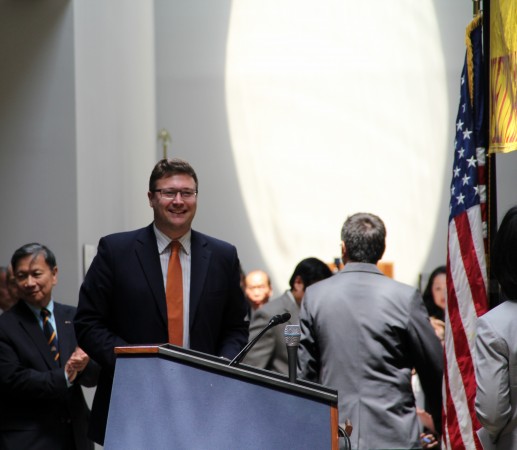
Rupert Abbott represented Amnesty International at the Vietnam Human Right Day event on Capitol Hill, May 9, 2013. (Shar Adams/The Epoch Times)
 By Shar Adams, Epoch Times | May 20, 2013
By Shar Adams, Epoch Times | May 20, 2013
WASHNGTON—In 1994, President Bill Clinton declared May 11 Vietnam Human Rights Day in the hope it would ease political, civil, and religious repression in Vietnam. Nearly two decades later, the rights picture remains grim, however, motivating members of the United States Congress and human rights groups to ramp up pressure on Vietnamese authorities to change.
“We are here in the United States Congress to send a message to the government, particularly the communist party in Vietnam, that they have to respect the fundamental human rights of Vietnamese people, particularly when it comes to religious liberties and the rule of law,” said Rep. John Cornyn (R-Texas), host and keynote speaker at a Vietnam rights day event on Capitol Hill, May 9.
Rep. Alan Lowenthal (D-Calif.) said it was time to link trade to Vietnam’s progress on human rights as incentive, saying the country cannot be “rewarded” for its repressive behavior.
“If we are going to engage in economic growth in Vietnam, it has to occur with changes in human rights activities in the country,” he said.
Although economic reforms have placed Vietnam among the world’s fastest growing economies, affording it membership in the World Trade Organization in 2007, the Socialist Republic of Vietnam joins China, Cuba, and Laos as one of four remaining single-party socialist states ruled by communist ideology.
According to Human Rights Watch (HRW), the number of arrests and convictions of dissidents, including religious leaders, bloggers, and politically active citizens, has increased annually over the last 4 years, despite economic growth.
“Alarmingly, another 40 people were convicted in political trials in just the first six weeks of 2013, matching the total for 2012,” HRW’s John Sifton reported at a congressional hearing last month.
Freedom of Speech Stifled
With the advent of social media, Vietnamese authorities have clamped down particularly hard on bloggers and journalists.
Amnesty International reported the arrest last year of 14 democracy advocates accused of overthrowing the government, five of whom were bloggers who had written about freedom of expression.
“I have done nothing contrary to my conscience” said blogger Dang Xuan Dieu at the time of his sentencing. Vietnamese authorities were “trampling on the eternal good morals of the Vietnamese nation,” he said, according to a report on Amnesty’s website.
Rupert Abbott, a specialist on Vietnam and Amnesty’s representative at the May 9 event, referred to the arrests last week of a group of bloggers and activists who had endeavored to hold picnics in public parks to talk about human rights in Vietnam. They were beaten, interrogated, and arrested by police and hired thugs for their trouble.
“Vietnam continues to be one of the worst violators of freedom of expression in the world,” he said.
Vietnam is increasingly isolated in the region as a non-democratic nation as Burma moves to embrace democratic change. Vietnam is relying on U.S. support to boost trade and to resolve territorial disputes with China.
The combination of factors provides “a good opportunity to push for change,” Abbott said.
Religious Repression
Rep. Frank Wolfe (R-Va.)declared religious freedom “virtually non-existent” in Vietnam.
He noted that Vietnam had been relegated a ‘country of concern’ on account of its worsening record on the issue in the 2013 Annual Report from the United States Commission on International Religious Freedom.
“In summary things are very bad,” he said.
On Wednesday, Rep. Ed Royce (R-Calif.), Chairman of the House Foreign Affairs Committee, called for an end to non-humanitarian aid to Vietnam unless there were improvements in human rights.
“Vietnamese officials have brought their harassment of religious leaders, political dissidents, and student activists to new, draconian levels,” said Royce in a statement.
In the statement, Royce announced that he was co-sponsor of the Vietnam Human Rights Act, which would block non-humanitarian aid if no progress is made on human rights.
“The U.S. must continue to speak out,” he said.“Silence is not an option.”
Addressing the Vietnamese community at the May 9 event, Daniel Baer, Deputy Assistant Secretary for Democracy, Human Rights, and Labor, listed a litany of rights concerns in Vietnam identified in the U.S. Country Reports on Human Rights Practices 2012. Vietnam’s repressive tactics, particularly in regards to freedom of speech, would ultimately hold the country back, he said.
Baer was prevented from meeting a democracy activist last month in a bizarre tactic involving little old ladies who were recruited to block the road leading to the dissident’s house. Baer was in Hanoi for the annual U.S.–Vietnam Human Rights Dialogue and was prevented from meeting another activist who was detained in a police station until he had departed.
“What could have been a platform for solid movement,” he said, “has now been marred by behavior that calls into question the sincerity of any commitments they might make.”
The Associated Press contributed to this report.
Height Insoles: Hi, I do believe this is an excellent site. I stumbledupon …
http://fishinglovers.net: Appreciate you sharing, great post.Thanks Again. Keep writi…
Achilles Pain causes: Every weekend i used to pay a quick visit this site, as i w…






May 22, 2013
Pressure Mounting on Vietnam to Improve Human Rights
by Defend the Defenders • Dang Xuan Dieu
Rupert Abbott represented Amnesty International at the Vietnam Human Right Day event on Capitol Hill, May 9, 2013. (Shar Adams/The Epoch Times)
WASHNGTON—In 1994, President Bill Clinton declared May 11 Vietnam Human Rights Day in the hope it would ease political, civil, and religious repression in Vietnam. Nearly two decades later, the rights picture remains grim, however, motivating members of the United States Congress and human rights groups to ramp up pressure on Vietnamese authorities to change.
“We are here in the United States Congress to send a message to the government, particularly the communist party in Vietnam, that they have to respect the fundamental human rights of Vietnamese people, particularly when it comes to religious liberties and the rule of law,” said Rep. John Cornyn (R-Texas), host and keynote speaker at a Vietnam rights day event on Capitol Hill, May 9.
Rep. Alan Lowenthal (D-Calif.) said it was time to link trade to Vietnam’s progress on human rights as incentive, saying the country cannot be “rewarded” for its repressive behavior.
“If we are going to engage in economic growth in Vietnam, it has to occur with changes in human rights activities in the country,” he said.
Although economic reforms have placed Vietnam among the world’s fastest growing economies, affording it membership in the World Trade Organization in 2007, the Socialist Republic of Vietnam joins China, Cuba, and Laos as one of four remaining single-party socialist states ruled by communist ideology.
According to Human Rights Watch (HRW), the number of arrests and convictions of dissidents, including religious leaders, bloggers, and politically active citizens, has increased annually over the last 4 years, despite economic growth.
“Alarmingly, another 40 people were convicted in political trials in just the first six weeks of 2013, matching the total for 2012,” HRW’s John Sifton reported at a congressional hearing last month.
Freedom of Speech Stifled
With the advent of social media, Vietnamese authorities have clamped down particularly hard on bloggers and journalists.
Amnesty International reported the arrest last year of 14 democracy advocates accused of overthrowing the government, five of whom were bloggers who had written about freedom of expression.
“I have done nothing contrary to my conscience” said blogger Dang Xuan Dieu at the time of his sentencing. Vietnamese authorities were “trampling on the eternal good morals of the Vietnamese nation,” he said, according to a report on Amnesty’s website.
Rupert Abbott, a specialist on Vietnam and Amnesty’s representative at the May 9 event, referred to the arrests last week of a group of bloggers and activists who had endeavored to hold picnics in public parks to talk about human rights in Vietnam. They were beaten, interrogated, and arrested by police and hired thugs for their trouble.
“Vietnam continues to be one of the worst violators of freedom of expression in the world,” he said.
Vietnam is increasingly isolated in the region as a non-democratic nation as Burma moves to embrace democratic change. Vietnam is relying on U.S. support to boost trade and to resolve territorial disputes with China.
The combination of factors provides “a good opportunity to push for change,” Abbott said.
Religious Repression
Rep. Frank Wolfe (R-Va.)declared religious freedom “virtually non-existent” in Vietnam.
He noted that Vietnam had been relegated a ‘country of concern’ on account of its worsening record on the issue in the 2013 Annual Report from the United States Commission on International Religious Freedom.
“In summary things are very bad,” he said.
On Wednesday, Rep. Ed Royce (R-Calif.), Chairman of the House Foreign Affairs Committee, called for an end to non-humanitarian aid to Vietnam unless there were improvements in human rights.
“Vietnamese officials have brought their harassment of religious leaders, political dissidents, and student activists to new, draconian levels,” said Royce in a statement.
In the statement, Royce announced that he was co-sponsor of the Vietnam Human Rights Act, which would block non-humanitarian aid if no progress is made on human rights.
“The U.S. must continue to speak out,” he said.“Silence is not an option.”
Addressing the Vietnamese community at the May 9 event, Daniel Baer, Deputy Assistant Secretary for Democracy, Human Rights, and Labor, listed a litany of rights concerns in Vietnam identified in the U.S. Country Reports on Human Rights Practices 2012. Vietnam’s repressive tactics, particularly in regards to freedom of speech, would ultimately hold the country back, he said.
Baer was prevented from meeting a democracy activist last month in a bizarre tactic involving little old ladies who were recruited to block the road leading to the dissident’s house. Baer was in Hanoi for the annual U.S.–Vietnam Human Rights Dialogue and was prevented from meeting another activist who was detained in a police station until he had departed.
“What could have been a platform for solid movement,” he said, “has now been marred by behavior that calls into question the sincerity of any commitments they might make.”
The Associated Press contributed to this report.